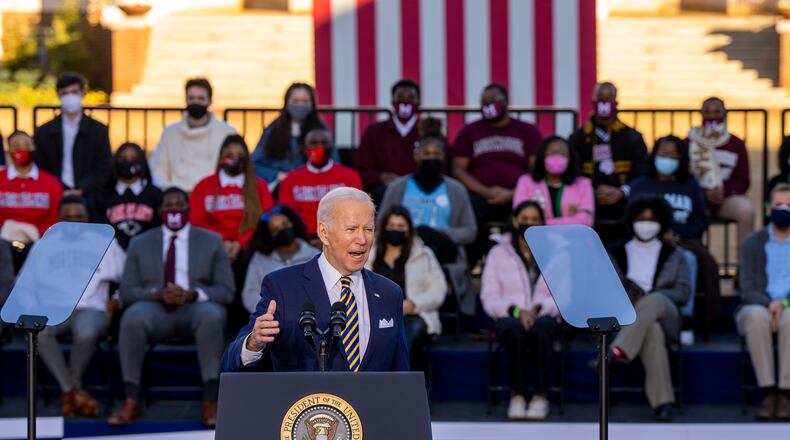President Joe Biden’s proposal to reorder the 2024 nominating schedule by elevating Georgia to the first wave of states to cast ballots faces an uncertain future amid opposition from Republicans who will have the final say on his plan.
Supporters have yet to persuade Secretary of State Brad Raffensperger, who has the authority to set the calendar, to endorse the shift. And their plan was dealt a setback when Gov. Brian Kemp’s administration abruptly announced he won’t back the switch.
Georgia Democrats aren’t giving up. They’ve continued to lobby state and national figures. They’re circulating studies promoting the high-dollar impact of an earlier vote. And they’ve won more time from the Democratic National Committee to hash out their strategy.
But they also acknowledge they face an uncertain road ahead as they prepare for the DNC’s final decision, which is expected to be announced in early February in Philadelphia. They frame the timing change as a commonsense bipartisan move.
“Both political parties stand to benefit from increasing Georgia’s prominence on the national stage, but our state as a whole would see huge economic benefits from an early presidential primary,” said U.S. Rep. Nikema Williams of Atlanta, who chairs the state Democratic Party.
Remaking the Democratic presidential primary process, which has long kicked off in Iowa and New Hampshire, was always going to be a tricky prospect.
Biden’s proposed overhaul would begin the voting in South Carolina on Feb. 3, with primaries three days later in Nevada and New Hampshire. Georgia would then vote on Feb. 13, followed by Michigan on Feb. 27.
It was quickly met with threats of revolt from Iowa and New Hampshire — and cheers from Democrats in the South who framed Georgia and South Carolina as far more reflective of the nation’s electorate than far whiter Iowa and New Hampshire.
But Democrats can’t unilaterally shuffle the calendar in Georgia. State law gives Raffensperger the power to realign the schedule, and Biden’s plan triggered a behind-the-scenes effort to win over the Republican.
While he hasn’t outright rejected the proposal, Raffensperger has laid out stringent requirements that may prove impossible for state Democrats to meet.
“We’ve been clear: This needs to be equitable so that no one loses a single delegate and needs to take place on the same day to save taxpayer funds,” Jordan Fuchs, Raffensperger’s top deputy, said last week.
States that reshuffled their schedules without the national party’s signoff would lose delegates, and national Republicans have already agreed to a calendar that keeps Iowa, New Hampshire, South Carolina and Nevada as the first 2024 states.
‘Let it roll’
Kemp’s opposition was the biggest setback. As Democrats scrambled to update the DNC on their progress, Kemp aide Cody Hall said in a late-night statement that caught even allies off guard that “the governor has no role in this process and does not support the idea.”
Although Kemp’s approval isn’t necessary, supporters of the switch hoped he would have provided political cover for Raffensperger and convinced Republicans that the shift would give voters outsized influence in shaping the wide-open GOP race for the White House.
Instead, Democrats are for now left without a powerful GOP advocate to make the case to the Republican National Committee to let Georgia move up on the schedule — a must to earn Raffensperger’s blessing.
Credit: Jason Getz/AJC
Credit: Jason Getz/AJC
And rank-and-file Republicans question why they would help Biden rearrange the nominating schedule at the behest of state Democrats.
“I don’t think we need to change it. I think it’s fine the way it is,” said state Rep. Kasey Carpenter, R-Dalton. “Aren’t people spending enough already in Georgia on elections? How much more important can we get? Let’s let it roll.”
Still, other Republicans are warming to the idea. Leo Smith, the Georgia GOP’s former minority engagement director, compared the new schedule to a calendar shakeup that Kemp approved when he was secretary of state.
Back then, Kemp helped engineer an “SEC primary” of mostly Southern states that cast ballots on the same day in 2016 to boost the region’s political clout. Smith said Republicans who supported that plan should back this latest effort to elevate Georgia’s importance.
Credit: HYOSUB SHIN / AJC
Credit: HYOSUB SHIN / AJC
Democrats also want critics to look beyond the political implications. They’ve highlighted studies that show early primary states attracted not just a boost in political spending, but a surge in federal dollars after the election. It’s an argument echoed by key business leaders.
“Money would flow into Georgia from out of state,” said A.J. Robinson, head of the Central Atlanta Progress. “Candidates would make promises to Georgia voters about their agendas. It would be a different type of attention than we usually receive.”
Supporters will have more time to hone their approach. The co-chairs of a key DNC committee gave Georgia a later deadline to solidify their proposal, saying they knew the shake-up would be “complicated but well worth the effort if we can get them done.”
Perhaps their most potent argument is persuading critics that a new schedule could be just as beneficial to Republicans. Rick Dent, a veteran strategist, said an earlier vote would cement the state as a “launching pad” for politicians from both parties.
“It means Georgia can now be a birthplace for national leaders, both Republican and Democratic,” said Dent, former press secretary for Democratic Gov. Zell Miller. “And an earlier primary helps launch those Georgian and Southern candidates.”
About the Author
Keep Reading
The Latest
Featured






